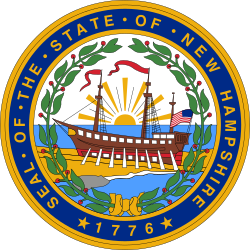This article relies largely or entirely on a single source .(June 2024) |
November 2 – December 5, 1792 | |||||||||||||||||||||||
| |||||||||||||||||||||||
| |||||||||||||||||||||||
| Elections in New Hampshire |
|---|
 |
The 1792 United States presidential election in New Hampshire took place between November 2 to December 5, 1792, as part of the 1792 United States presidential election to elect the president. Voters chose five representatives, or electors, to the Electoral College, who voted for President and Vice President.
Contents
New Hampshire voted for incumbent George Washington without any competitor.


